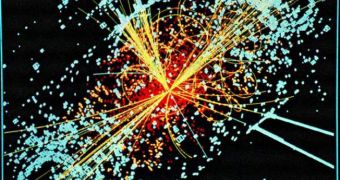A newly-proposed plan calls for the Large Hadron Collider to continue its search for the Higgs boson by the end of 2012, and not 2011 as originally scheduled. In other words, physicists operating the accelerator and its detectors want to keep on searching for the elementary particle for another year.
The Higgs is tremendously important because it's the “missing link” of the Standard Model, and also because experts believe it is the thing that gives mass to energy, turning it into particles.
The original plan was to have the LHC operate until the end of 2011, then close it down throughout 2012 for important upgrades, and finally reopen it at the beginning of 2013.
But officials from the European Organization for Nuclear Research (CERN), near Geneva, in Switzerland, are seriously considering the proposal. They are responsible for managing the world's most powerful particles accelerator.
One of the main reasons why the new proposal was set forth is that physicists working at the facility believe the discovery of the Higgs may be just around the corner. A lot of progress has been made over the past two years, and everyone is confident a major breakthrough is about to happen.
“It would be a shame to stop,” explains Steve Myers, the man who is responsible for maintaining and upgrading the accelerator, as quoted by Nature News.
At this point, the LHC is operating at only half of its maximum energy level. This is because of the glitch it suffered in September 2008. The malfunction is also the main reasons why operations were scheduled to stop at the end of 2011.
But scientists say that even at 7 gigaelectronvolts (GeV), collisions taking place at the LHC are sufficiently energetic to reveal the Higgs. The upgrade is therefore not needed to find the particle.
According to the director for research and computing at CERN, Sergio Bertolucci, the Higgs may weight between 114 and 600 gigaelectronvolts, which puts it well into the range of the LHC.
“If we stop the machine with 3,000 people apiece in the experiments waiting for data, there is no way we could get home at night without having slashed tires on our cars,” says Myers.
“The experiments are going well, the accelerator is going well. Let's really push it to where we can get a meaningful data set to do lots of physics,” explains expert Joe Incandela.
He holds an appointment as a physicist at the University of California in Santa Barbara (UCSB), and is also the deputy spokesman for the CMS detector on the LHC.
The final decision on extending the accelerator's operation will be made in late January, at a meeting to be held in the French town of Chamonix.

 14 DAY TRIAL //
14 DAY TRIAL //